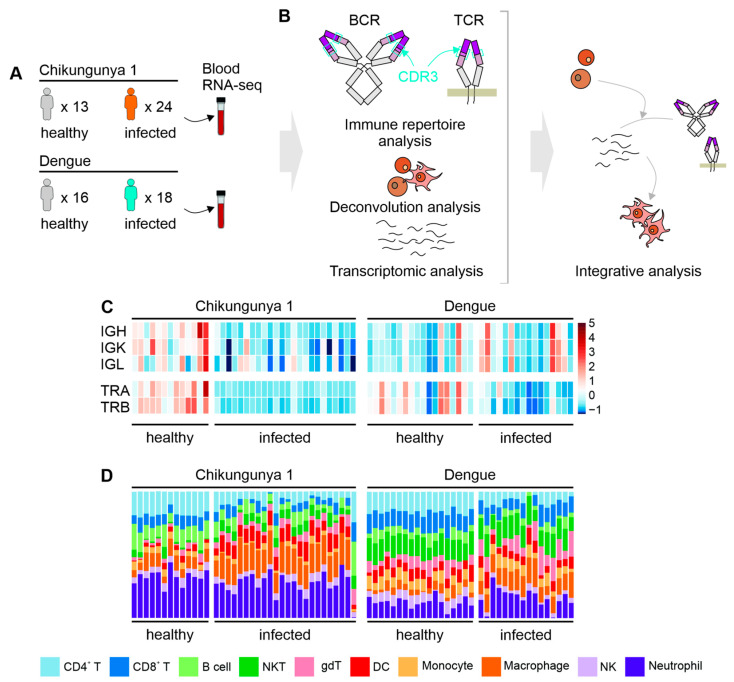Chikungunya-Driven Gene Expression Linked to Osteoclast Survival and Chronic Arthralgia.
Chikungunya fever (CHIKF), caused by the Chikungunya virus (CHIKV), manifests as acute febrile illness often associated with polyarthritis and polyarthralgia. Although the acute symptoms resolve within two weeks, many patients experience prolonged joint pain and inflammation, resembling rheumatoid arthritis (RA). This study aimed to identify molecular markers related to joint pain and chronicity in CHIKV-infected individuals by analyzing blood transcriptomes using bulk RNA sequencing. B- and T-cell receptor (BCR and TCR) diversity was assessed through computational analysis of RNA-seq data, revealing a significant reduction in CDR3 diversity in CHIKV-infected individuals compared to healthy controls. This reduced diversity was associated with the upregulation of genes involved in osteoclast differentiation and activation, particularly through the RANK/RANKL signaling pathway. These findings suggest a potential link between immune dysregulation and enhanced osteoclast activity, which may contribute to the persistence of joint pain in chronic CHIKF. Targeting osteoclast-related pathways could offer therapeutic strategies for managing chronic symptoms in CHIKF patients.
Authors
Urbanski AH, Maso VE, Martins FM, da Costa-Martins AG
External link
Publication Year
Publication Journal
Associeted Project
Systems Immunology of Human Diseases
Lista de serviços
-
StructRNAfinder: an automated pipeline and web server for RNA families prediction.StructRNAfinder: an automated pipeline and web server for RNA families prediction.
-
CEMiTool: a Bioconductor package for performing comprehensive modular co-expression analyses.CEMiTool: a Bioconductor package for performing comprehensive modular co-expression analyses.
-
webCEMiTool: Co-expression Modular Analysis Made Easy.webCEMiTool: Co-expression Modular Analysis Made Easy.
-
Assessing the Impact of Sample Heterogeneity on Transcriptome Analysis of Human Diseases Using MDP Webtool.Assessing the Impact of Sample Heterogeneity on Transcriptome Analysis of Human Diseases Using MDP Webtool.
-
Predicting RNA Families in Nucleotide Sequences Using StructRNAfinder.Predicting RNA Families in Nucleotide Sequences Using StructRNAfinder.
-
OUTBREAK: a user-friendly georeferencing online tool for disease surveillance.OUTBREAK: a user-friendly georeferencing online tool for disease surveillance.
-
Noninvasive prenatal paternity determination using microhaplotypes: a pilot study.Noninvasive prenatal paternity determination using microhaplotypes: a pilot study.
-
Editorial: User-Friendly Tools Applied to Genetics or Systems Biology.Editorial: User-Friendly Tools Applied to Genetics or Systems Biology.
-
Automatic detection of the parasite Trypanosoma cruzi in blood smears using a machine learning approach applied to mobile phone imagesAutomatic detection of the parasite Trypanosoma cruzi in blood smears using a machine learning approach applied to mobile phone images
-
Tucuxi-BLAST: Enabling fast and accurate record linkage of large-scale health-related administrative databases through a DNA-encoded approachTucuxi-BLAST: Enabling fast and accurate record linkage of large-scale health-related administrative databases through a DNA-encoded approach
-
Ten quick tips for harnessing the power of ChatGPT in computational biologyTen quick tips for harnessing the power of ChatGPT in computational biology

